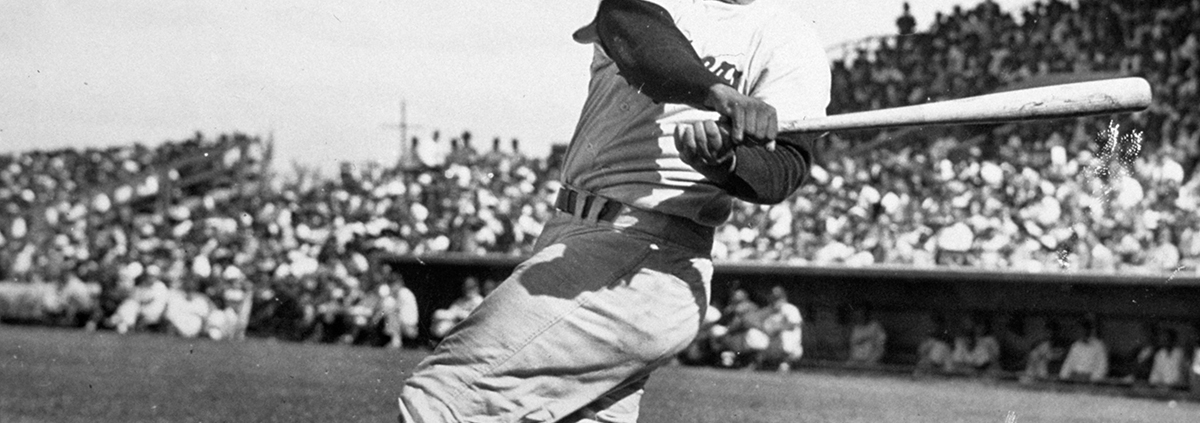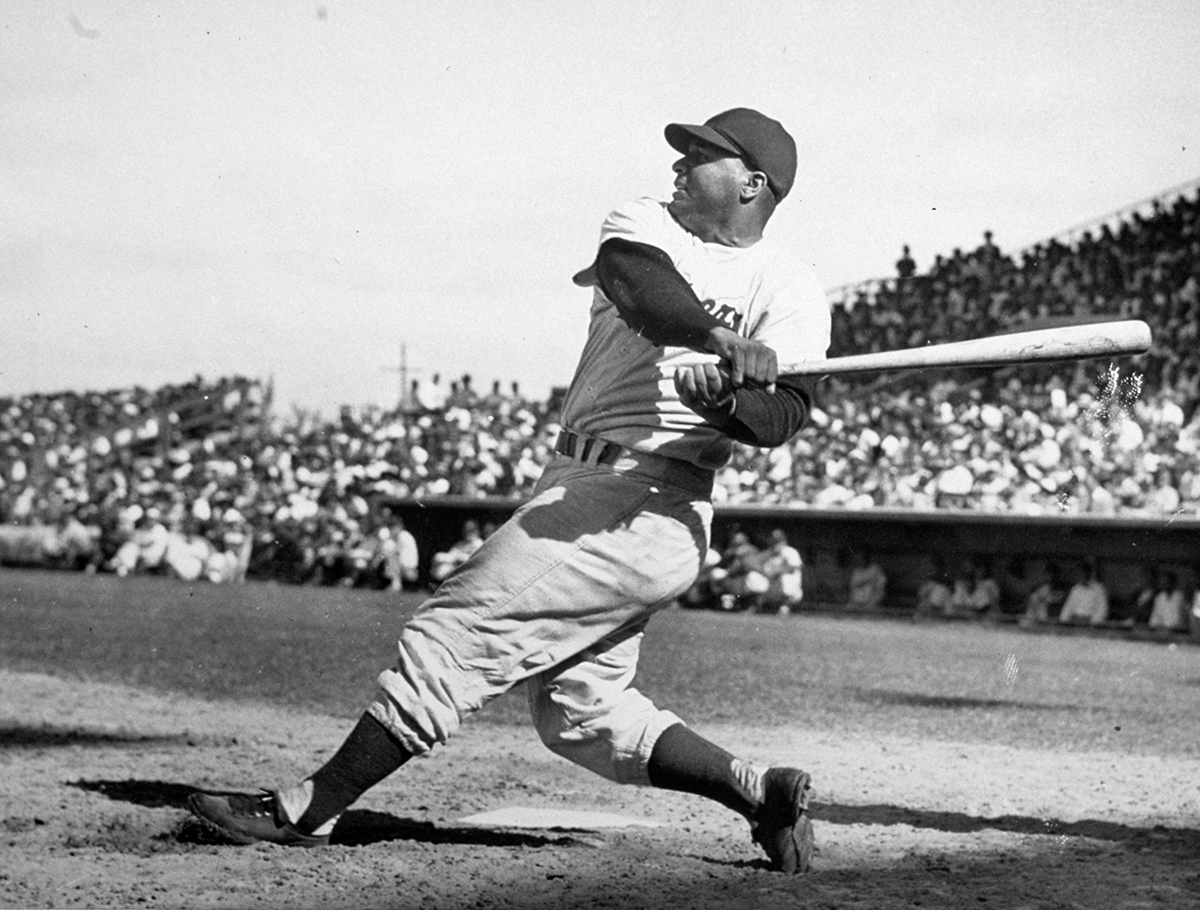August 8, 1954: Dodgers enjoy a 13-run inning in rout of Redlegs
Roy Campanella with a mighty swing during spring training with the Brooklyn Dodgers in the early 1950s. (SABR-Rucker Archive)
Most of the time the number 13 is considered unlucky. For the Brooklyn Dodgers on this fateful day in August, the number 13 was very, very lucky. Dem Bums were able to get to three Cincinnati Redlegs pitchers for 13 runs in the eighth inning as they won, 20-7. The Dodgers’ offensive explosion was their most productive single inning of the 1954 season, in which they finished second in the National League with 778 runs scored. (The sixth-place St. Louis Cardinals led the league with 799 runs scored.)
On August 8 skipper Birdie Tebbetts‘ Redlegs (52-57) were in sixth place. The Dodgers had lost six of their previous 10 games to fall to 65-44, in second place, and trailed the first-place New York Giants by four games.
Dodgers manager Walter Alston sent seven-year veteran Carl Erskine to the mound. Erskine had won 20 games for first time in his career in 1953 and led the NL with a .769 winning percentage. So far in 1954 he was 12-10. Tebbetts chose second-year major leaguer Fred Baczewski (5-6) to start for Cincinnati.
The Brooklyn Daily Eagle’s Tommy Holmes wrote, “This was an astounding performance for a somnolent Sunday after 10,884 customers had deserved more than two hours as the Dodgers and their opposition droned through the routine maneuvers.”1
Bobby Adams, the Redlegs’ leadoff hitter, singled. Nino Escalera struck out. A single by Lloyd Merriman sent Adams to second base. Cincinnati’s cleanup hitter, Ted Kluszewski, singled to score Adams and give the Redlegs a 1-0 lead.
Brooklyn wasted little time in tying the game. Don Hoak led off the Dodgers’ first with a walk and scored when Pee Wee Reese doubled to left.
The Redlegs retook the lead in the top of the third inning. Escalera tripled with one out. Merriman struck out swinging, but Kluszewski and Wally Post walked, and the Redlegs had filled the bases. Chuck Harmon singled to center field to score both Escalera and Kluszewski and the Redlegs had a 3-1 lead.
Brooklyn came back in the fourth inning when Gil Hodges and Carl Furillo led off with singles. Jim Gilliam grounded into a double play that scored Hodges, and Roy Campanella‘s home run into the left-field stands knotted the score, 3-3.
Karl Drews replaced Baczewski to begin the fifth inning.
“You couldn’t picture a game that would end up 20-7 being close at any time – and yet this one was as the Brooks came up for the sixth,” observed sportswriter Dick Young.2 The Dodgers emphatically broke the tie in the sixth inning against the Redlegs’ Drews. Jackie Robinson led off with a walk. A single by Hodges sent Robinson to second base. Furillo hit a single to score Robinson and send Hodges to third base. Gilliam atoned for his earlier double-play ball when he hit a Drews 3-and-2 pitch for a home run to right field that gave Brooklyn a 7-3 lead.
The Redlegs got a run back in the seventh inning when Hobie Landrith led off with a single, took second on a wild pitch and third base on a groundout by Ed Bailey, then scored on a sacrifice fly by Bobby Adams.
The Redlegs made it a 7-5 game in the top of the eighth when Kluszewski doubled, went to third base on a single by Wally Post, and scored on a sacrifice fly by Harmon.
The scoreboard official was extremely busy in the bottom of the eighth inning as 19 Dodgers came to the plate. Hodges began the carnage with a triple to right field off of the Redlegs’ new pitcher, Howie Judson, and scored on Furillo’s fly ball. Gilliam grounded out and it seemed as though the Redlegs would get out of the inning relatively unscathed.
Dodgers beat writer Tommy Holmes noted, “It was at this stage that Howie Judson decided to put Roy Campanella on base and pitch to Labine, one of the game’s most harmless hitters. Trouble was he also walked Labine and Don Hoak to fill the bases.”3 Before the third out was attained, four Redlegs pitchers saw 15 consecutive Dodgers batters reach base, filling the bases four times and scoring a total of 12 runs.
Pee Wee Reese reached on an error by Harmon at third base that scored Campanella and Labine, leaving Hoak at third base and Reese at second. Duke Snider got the Dodgers’ fourth walk of the inning off the Redlegs’ second pitcher of the inning, Jackie Collum, to again load the bases. Robinson hit a line-drive single to right field and all three runners scored. Sandy Amoros ran for Robinson and went to third base on a ground-rule double by Hodges. Furillo singled to center field to score Amoros and Hodges with the seventh and eighth runs of the inning.
Gilliam was hit by a pitch. Campanella’s single to left field drove in Furillo. Labine walked to load the bases for the third time in the inning. “The bases were filled and Frank Smith, Cincinnati’s ace reliever could not stand it any more,” Tommy Holmes reported. He walked from the bench to the mound and after eight warm-up pitches faced Hoak. On a 3 and 2 pitch, Don hit a grand slam home run into the left field seats.”4 Hoak cleared the bases with a grand slam, his first in the majors. Smith stayed in the game. Reese walked, Snider singled, and Amoros got the Dodgers’ seventh walk of the inning, loading the bases for the fourth time, and Tebbetts yanked Smith.
Gil Hodges, coming to the plate for the third time in the inning, facing Art Fowler, the Redlegs’ fourth pitcher of the inning, flied out to end the damage with Brooklyn now holding a 20-5 lead.
Of the 19 Dodgers who batted in the inning, seven hit safely, seven walked, one was hit by a pitch, and one got on as the result of Chuck Harmon’s error that made the last dozen Dodgers’ runs unearned. “The 13 runs set an NL record for most runs in the eighth inning and the 12 tied the record for most runs with two outs in one inning,” Cincinnati scribe Lou Smith reported. “The Dodgers themselves set the record on May 21, 1952, and against who? The Redlegs of course.”5
In the ninth, the Redlegs converted three consecutive singles and a sacrifice fly into two runs, and made make the final score Brooklyn 20, Cincinnati 7.
Roy Campanella began his professional baseball career at age 15 with the Negro League Washington Elite Giants in 1937. In 1948 he debuted with the Dodgers and established himself as the NL’s most productive catcher, winning three league MVP awards. (Photo: SABR-Rucker Archive)
Kluszewski led the Redlegs’ offense, going 3-for-4 with a double. Hodges had two singles, a double, and a triple in six at-bats while scoring four runs to lead the Dodgers offense. Furillo and Hoak each had four runs batted in. Furillo had three hits, and Hoak, Reese, and Campanella two each.
Despite the runaway score, the Dodgers only outhit the Redlegs by 16 to 12. But Brooklyn was aided by the 11 bases on balls given up by Cincinnati’s pitchers. Brooklyn used two pitchers (Erskine and Labine) and a total of 11 players, while the Redlegs used seven pitchers and 20 players in suffering the defeat. Lou Smith’s final assessment: “What might have been a routine Red Leg defeat with honor was turned into a rout today when the Dodgers scored 13 runs in the eighth inning to apply a 20-7 crusher on the Cincinnati club at Ebbets Field.”6
At the end of the season, Brooklyn had 92 wins and 62 losses, placing them five games behind the eventual World Series champion New York Giants. Cincinnati’s record of 74 wins and 80 losses put them in fifth place, 23 games behind the Giants.
SOURCES
In addition to the game story and box-score source cited in the Notes, the author consulted the Baseball-Reference.com and Retrosheet.org websites.
NOTES
1 Tommy Holmes, “None-On Intentional Pass Ruins Redlegs – Dodgers Get 13 Runs After Weird Move,” Brooklyn Eagle, August 9, 1954: 13.
2 Dick Young, “Dodgers Beat Redlegs, 20-7; Rack Up 13 Runs in 8th,” New York Daily News, August 9, 1954: 20.
3 Holmes.
4 Holmes.
5 Lou Smith, “Extra Point Missed, Dodgers Win, 20-7,” Cincinnati Enquirer, August 9, 1954: 26.
6 Smith.
Additional Stats
Brooklyn Dodgers 20
Cincinnati Redlegs 7
Ebbets Field
Brooklyn, NY
Box Score + PBP:
Corrections? Additions?
If you can help us improve this game story, contact us.



